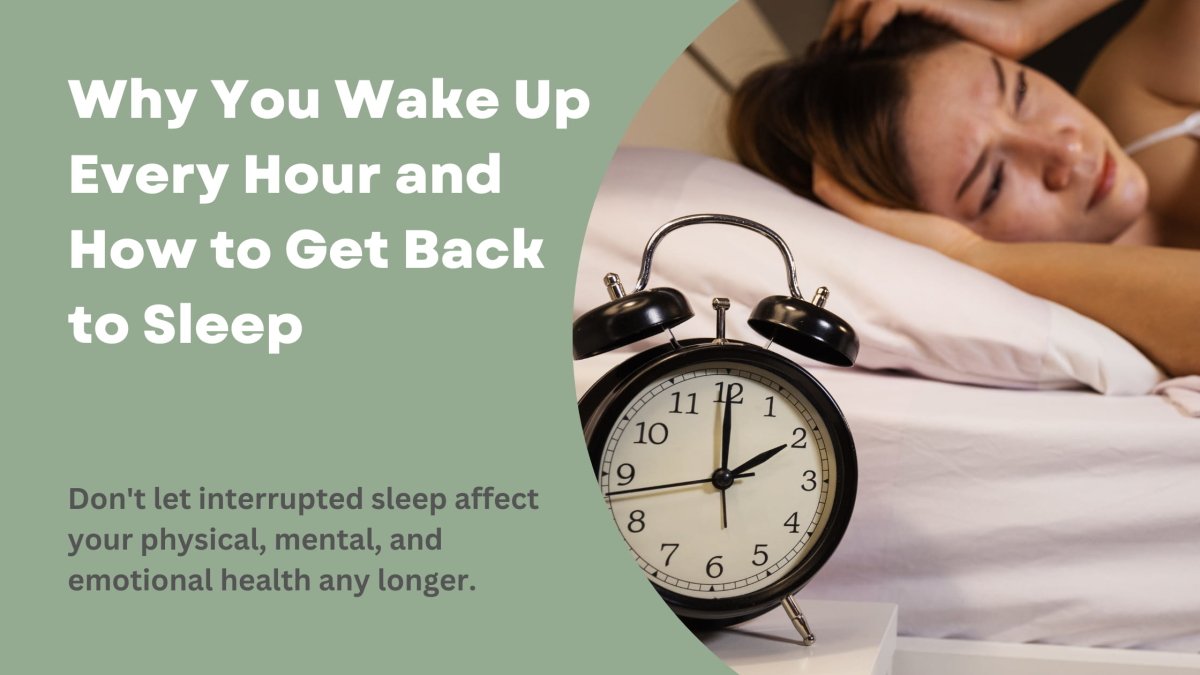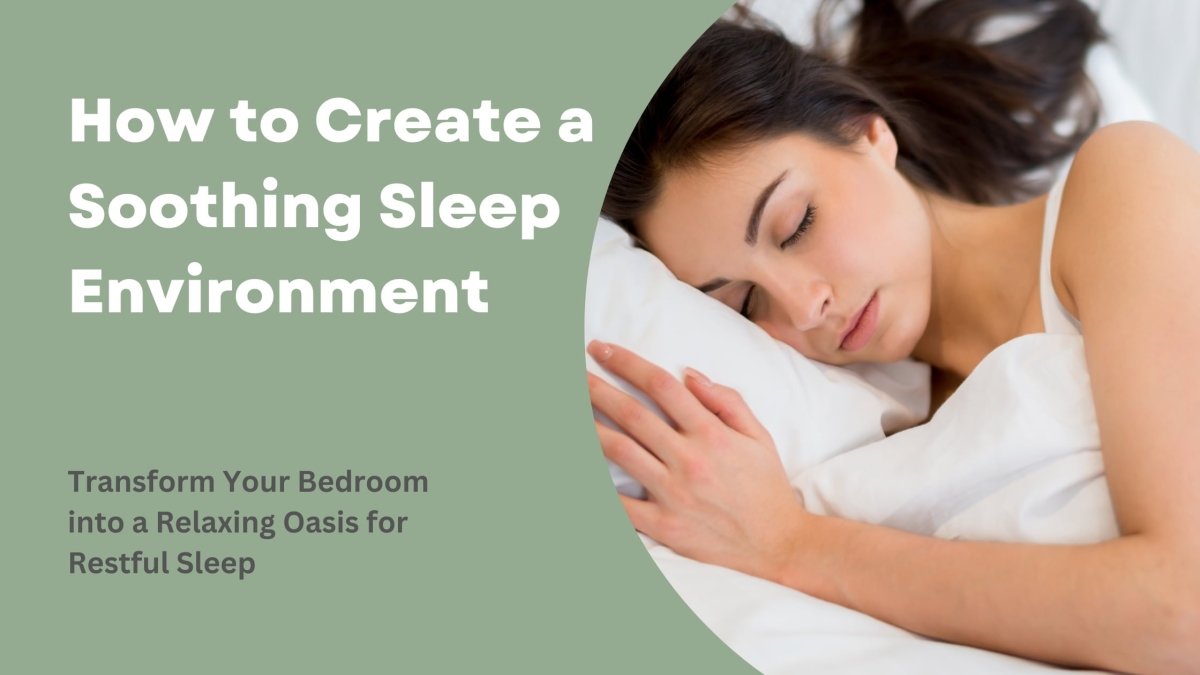Why You Wake Up Every Hour and How to Get Back to Sleep
You know you shouldn't be wide awake in the middle of the night. You want to roll over and go back to sleep, but it seems like you've been waking up every hour. You can't remember the last time you enjoyed a peaceful night that wasn't broken up by tossing and turning.
You aren't alone. More than 30 percent of adults deal with this issue every night. Quality sleep is very important to physical, mental and emotional health. Deep relaxation recharges the body, keeps the mind sharp and renews your overall sense of well-being.
Even your dreams play a vital role in the restorative process that depends on sound sleep. Constantly waking up during the night leaves you feeling tired and grumpy, and that's not a good way to greet a new morning.
Understanding and Conquering Sleepless Nights
Chronic sleeplessness can become a serious problem, but there are a surprising number of solutions. Reclaiming your ability to rest starts with understanding why you wake up so frequently.
Once you identify the things that keep you from sleeping soundly, you can focus on different ways to quickly relax and slip back into sweet dreams. You can also develop new habits that let you naturally and permanently reclaim the healthy sleep you've been missing for so long.
Let's take a closer look at each important point so that you can formulate a plan that works best for you. You really can conquer sleepless nights and finally look forward to going to bed again.
Ten Reasons Why You Keep Waking Up Every Hour
1. Anxiety-Induced Insomnia
Primary insomnia is a common disorder that causes a loss of sleep due to stress and anxiety. Secondary insomnia is defined as a condition that accompanies serious physical health issues.
When you wake up in the middle of the night worried about work or personal problems, it's very hard to relax and go back to sleep. Your concerns about not resting add to a sense of impatience and dread. The overall effect sets up a cycle of insomnia that keeps you tossing and turning.
Weighted blankets can be a valuable asset if you are dealing with anxiety. Here is what The Sleep Foundation says about them " Weighted blankets are designed to reduce stress and promote feelings of relaxation, which in turn can help you fall asleep more quickly"
2. Unsettling Nightmares
Vivid dreams can be wonderful, but they can also be filled with deep fear. Realistic visions and an overwhelming sense of unease can turn an ordinary bad dream into a terrible experience. When this happens repeatedly through the night, it jolts you awake over and over.
Nightmares often occur after a traumatic life event. They can result from the same daily pressures that bring on insomnia. Heavy meals, caffeine or alcohol before going to bed can also trigger nightmares.

3. Panic Attacks
If you frequently wake up trembling and feeling short of breath, you may be dealing with nocturnal panic attacks . Instead of experiencing a nightmare, you're startled awake with an overwhelming sense of panic and an accelerated heart rate.
Nocturnal panic attacks are especially hard to deal with because they make it extremely difficult to get back to sleep. The fear of suffering another attack turns into a lingering sense of dread. While the cause for these nighttime disturbances isn't clear, stress is considered a primary factor.
4. Circadian Rhythm Disorders
Normally, your body runs on an internal clock that regulates your temperature and hormone levels. This circadian rhythm plays a critical role in making you drowsy before bedtime, and it helps you sleep soundly through the night.
When your internal routine is thrown off-balance, you're thrown into a cycle of constantly waking up. Circadian rhythm disorders can result from changes in routine, over-exposure to electronic gadgets or a change in bedroom light levels.
5. Bad Eating Habits
You enjoy a snack in the evening, but you don't always make the best decisions on your way to bed. Eating before sleeping interferes with circadian rhythms, and a heavy dinner can leave you tossing and turning with indigestion. These are just a few food and beverage choices that can keep you awake at night.
• Pizza and burgers
• Dark chocolate
• Spicy food
• Caffeinated drinks
• Alcoholic beverages
6. Sleep Apnea
You may not realize that you're suffering from sleep apnea , but it's a common nighttime disorder. When upper airways become blocked, normal breathing is abruptly interrupted.
Your body reacts by snapping you awake, and the disorder tends to worsen with age. If you suspect sleep apnea is the reason you continually wake up during the night, you should consult with your doctor.

7. Restless Leg Syndrome
The sensations associated with restless leg syndrome range from itching and throbbing to tingling that resembles electric shocks. This is another sleep problem that doesn't have an obvious cause, but it tends to run in families.
Because restless leg syndrome most often occurs while you're sleeping, it can be a very disruptive condition. The discomfort can repeatedly awaken you and leave you feeling exhausted in the morning.
8. Too Much Warmth
Your temperature naturally drops when you go to sleep, but your mattress may be working against you. If you tend to be a hot sleeper , a warm bed can make you toss and turn as you try to cool down.
A mattress that traps body heat traps you in a cycle of waking up, adjusting the covers and trying to get back to sleep. As you drift off, your core temperature rises again, and that discomfort wakes you up over and over.
9. Too Many Gadgets
Do you check in with Facebook as you head for the bedroom? Are you reviewing text messages on your smartphone or reading blog posts on your tablet? All those gadgets stimulate the brain when you should be settling down to sleep.
Overexposure to laptop, tablet and smartphone screens before bedtime exposes you to blue light that suppresses melatonin production . If you wake up frequently every night, your favorite electronics might be to blame.
10. A Bad Mattress
It's a gradual process, so you don't realize there's a problem right away. Over time, you notice a shift in sleeping habits. You awake during the night feeling stiff and uncomfortable. You change positions, fall back to sleep and wake up again.
This type of restlessness is often caused by a cheap innerspring mattress or memory foam bed that's losing its structural integrity. Cheap mattresses wear out quickly, and that takes the enjoyment out of knowing you saved a little money when you first purchased that bargain bed.
Ten Techniques for Quickly Getting Back to Sleep
1. Read to Relax
Waking up every few hours becomes very upsetting, and that anxiety makes it harder to go back to sleep. Instead of fighting your wakefulness, relax, and embrace it for a little while. Reading is an ideal way to unwind, but think twice about your choices.
Don't flip through online blogs or tune into breaking news stories. Keep a collection of fiction on the nightstand, and use it as an escape. A good book can be one of your best sleeping aids.

2. Get Out of Bed
If you're not the type to read yourself to sleep, try getting up and out of the bedroom. Give yourself 10 or 15 minutes to do something that doesn't take much effort. Listen to soft music, sort through mail or set out a few things that will give you a jump start on the morning.
The idea is to distance yourself from the bed and reduce your frustration from repeatedly waking up. When you do snuggle back down, be patient as your body resets its internal sleeping mechanism.
3. Clear Your Mind
For centuries, meditation has served as a relaxation routine that helps with sleeplessness . These are the most popular self-calming exercises for quickly getting back to sleep.
• Concentration Meditation - Your awareness is focused on something specific like a mantra.
• Mindfulness Meditation - By paying attention to your body, you tune out everything else.
• Affirmation Meditation - Positive thoughts replace the anxiety you feel over continually waking up.
4. Turn Down the Lights
As the sun goes down and lights become dim, your internal sleep system begins to produce melatonin. To ensure this vital hormone's maximum performance, you should always go to bed with the lights turned off.
Take a quick look around the room. Does your clock have a bright digital display? Are there street lights outside the window or a nightlight close to the bed? Turning down light sources in your bedroom ramps up your ability to unwind and return to sleep after waking up.
5. Take a Deep Breath
Deep breathing techniques are easy to perform in bed and very effective for settling back down into a good night's sleep. Try different relaxation methods in combination with other routines to break the cycle of chronic sleeplessness.
• Lower your blood pressure and heart rate with deep abdominal breaths.
• Equalize breathing by slowly counting as you inhale and exhale.
• Use your thumb to breathe in through one nostril and then exhale through the other.
6. Change Sleeping Positions
Everyone has a favorite sleeping position , but changing things up breaks the pattern of constantly waking up. For example, the fetal position might feel most comfortable, but it can restrict your diaphragm and strain hips and knees.
Think above your shoulders too. Rearranging pillows can help control sleep apnea symptoms and reduce snoring problems. Over time, you can develop a better sleeping style by trying different body positions and pillow arrangements.
Progressive muscle relaxation is one of the easiest techniques for overcoming nocturnal tossing and turning. When you wake up in the middle of the night, calmly think about relaxing from head to toe.
Start with facial muscles, relax neck tendons, and feel the tension leaving your shoulders. With your eyes closed, continue to consciously relax muscles in your chest, hips, legs and feet. This simple exercise in letting go is one of the most effective ways to go back to sleep.

8. Turn on a Fan
If you find yourself repeatedly waking up and kicking off the covers, set up a bedside fan. One click bathes you in cool air, circulates a soft breeze through the room and provides soothing white noise.
Make a mental note to always check the thermostat before going to bed. Dialing it down a few degrees can make a difference in how well you sleep during the night.
9. Ignore the Clock
A wall clock in the bedroom can become a distraction in the middle of a sleepless night, so move it to another location. If you have a clock on the dresser or night stand, turn it so that it doesn't face the bed. When you're waking up every hour, you don't want to check the time.
Watching a clock after you're in bed is an exercise in frustration. As the hours slowly go by, you become fixated on how much sleep you're losing. Don't let time become a factor as you learn how to overcome wakefulness.
10. Visualize Peaceful Sleep
When you close your eyes and recall wonderful memories, you're practicing a type of visualization. Use that same approach to create a sense of peace and well-being that helps you get back to sleep.
Visualization incorporates all the senses as you imagine a scene of perfect serenity. It could be watching a sunset on the beach, walking through a beautiful forest or simply feeling a sense of freedom and lightness. This type of relaxation is effective because it's very personal.
Ten Ways to Make Sure You Sleep Well Every Night
1. Develop a Bedtime Routine
Turn your bedtime routine into a sleeping aid. The things you do each night before slipping under the covers send quiet signals to your brain. The process helps your body transition into nighttime mode, and that helps you become comfortably drowsy as you settle in.
Do all you can to establish a turn-in time habit too. Try to go to bed at the same hour every evening. Make sure you sleep well by making sure you stick to a bedtime routine.
2. Respect Your Bed
When you walk into the kitchen, your appetite perks up. When you sit down at the home desk, you slip into work mode. Let your bed become a personal area dedicated to just a few important things.
Don't use it to sprawl out and fire up the laptop. Don't think of it as a central location for laying back and checking social media. This is a very intimate space, so keep it that way. Make your bed a special place dedicated to sharing romantic time with your partner and enjoying a good night's sleep.
3. Say No to Naps
A short nap can often help you deal with a hectic schedule. Resting during the day also seems like an obvious solution to sleep deprivation. However, naps can get in the way of overcoming chronic wakefulness.
A quick snooze might be refreshing, but it can interfere with your internal sleep mechanisms. Resist the temptation to snuggle down on the couch when you feel drowsy. Saying no to naps lets you say yes to a better night's sleep.
4. Stay Away From Stimulants
A hot cup of coffee always gets the morning off to a great start. The java that opens your eyes and energizes your mood has the same caffeinated effect when you sip a cup later in the day. Tea isn't as strong, but it has the same effect on your metabolism.
Wine and cocktails are stimulants too. You don't have to swear off favorite beverages to enjoy deep, peaceful sleep. Instead, avoid them the last few hours before going to bed.
5. Make Late Dinners Light
A big dinner is satisfying, but its timing makes a big difference in how well you sleep at night. A heavy meal loads your body with calories that you don't burn off when you're headed for bed. Your metabolism stores the excess, and that leads to weight gain.
Eating late also increases the likelihood of waking up with indigestion or acid reflux. If you have to eat late in the evening, you'll sleep better if you keep it light.

6. Enjoy Home Sleep Remedies
Even the best bedtime routines can occasionally let you down. Don't risk your health with over-the-counter medications. Get back to sleep naturally with home remedies that are safe and easy on the budget. These are just a few proven sleeping aids that you can keep on hand in the cabinet or refrigerator.
• Kiwi fruit
• Plain yogurt
• Passionfruit tea
• Chamomile tea
• Tart cherry juice
7. Banish Blue Light
The blue light emitted by electronic gadgets has a proven negative impact on your sleep cycle. The short wavelength exerts a strong suppressive effect on melatonin , and that can result in a number of sleep disorders. Too much exposure before going to bed can lead to waking up repeatedly.
Sleeping soundly all night doesn't require giving up smartphones, laptops and tablets. Just turn them off several hours before you turn in, and permanently banish them from the bedroom.
8. Tune in White Noise
The soft sound of a quiet bedside fan is a good example of soothing white noise. You can hear it, but it isn't disruptive. Instead, it covers up noises that might otherwise keep you awake.
By masking external sounds, white noise keeps them from interrupting your internal sleep process. Turning on the fan or a small machine designed to generate white noise can make it much easier to stay asleep through the night.
9. Buy a Quality Mattress
Deep, peaceful sleep is vital to your health and your outlook on life. You want to wake up every morning refreshed and ready for the day. An old mattress simply can't comfort you with the support of a good night's sleep.
When you're ready to buy a new mattress, shop around, and choose a quality bed. It's a decision you'll enjoy sleeping on for many years to come.
10. Create a Personal Sleep Cocoon
Make sure you sleep well each night by turning the bedroom into your personal sleep cocoon. Set up a small table just outside the door, and make it your designated drop-off spot for gadgets. Create a serene haven by painting bedroom walls in soft shades of your favorite colors.
Drape sheer fabric over windows, pile throw pillows on the bed, and keep the air fresh with potted plants. Transform your sleeping environment into a personal place that makes you feel safe, comfortable and ready to go to sleep.
Taking the Very Best Care of Yourself
You don't have to suffer through waking up over and over. You don't have to face every morning feeling exhausted. There are solutions to chronic sleeplessness. Think about the different ideas in this post, and consider different changes you can make in your sleeping lifestyle.
Here at Sweet Zzz, we enjoy sharing sleep strategies that let you enjoy the peaceful slumber you deserve. We want you to take the very best care of yourself day and night, and we're always here to help.





